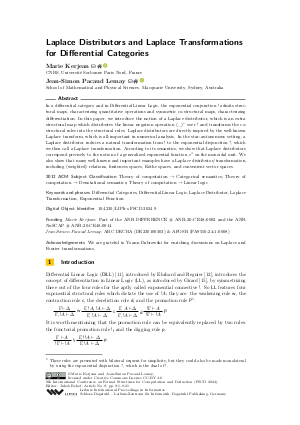Laplace Distributors and Laplace Transformations for Differential Categories
Authors
Marie Kerjean  ,
Jean-Simon Pacaud Lemay
,
Jean-Simon Pacaud Lemay 
-
Part of:
Volume:
9th International Conference on Formal Structures for Computation and Deduction (FSCD 2024)
Part of: Series: Leibniz International Proceedings in Informatics (LIPIcs)
Part of: Conference: Formal Structures for Computation and Deduction (FSCD) - License:
 Creative Commons Attribution 4.0 International license
Creative Commons Attribution 4.0 International license
- Publication Date: 2024-07-05
File

PDF
LIPIcs.FSCD.2024.9.pdf
- Filesize: 0.87 MB
- 21 pages
Document Identifiers
Subject Classification
ACM Subject Classification
- Theory of computation → Categorical semantics
- Theory of computation → Denotational semantics
- Theory of computation → Linear logic
Keywords
- Differential Categories
- Differential Linear Logic
- Laplace Distributor
- Laplace Transformation
- Exponential Function
Metrics
- Access Statistics
-
Total Accesses (updated on a weekly basis)
0PDF Downloads0Metadata Views
Abstract
In a differential category and in Differential Linear Logic, the exponential conjunction ! admits structural maps, characterizing quantitative operations and symmetric co-structural maps, characterizing differentiation. In this paper, we introduce the notion of a Laplace distributor, which is an extra structural map which distributes the linear negation operation (_)^∗ over ! and transforms the co-structural rules into the structural rules. Laplace distributors are directly inspired by the well-known Laplace transform, which is all-important in numerical analysis. In the star-autonomous setting, a Laplace distributor induces a natural transformation from ! to the exponential disjunction ?, which we then call a Laplace transformation. According to its semantics, we show that Laplace distributors correspond precisely to the notion of a generalized exponential function e^x on the monoidal unit. We also show that many well-known and important examples have a Laplace distributor/transformation, including (weighted) relations, finiteness spaces, Köthe spaces, and convenient vector spaces.
Cite As Get BibTex
Marie Kerjean and Jean-Simon Pacaud Lemay. Laplace Distributors and Laplace Transformations for Differential Categories. In 9th International Conference on Formal Structures for Computation and Deduction (FSCD 2024). Leibniz International Proceedings in Informatics (LIPIcs), Volume 299, pp. 9:1-9:21, Schloss Dagstuhl – Leibniz-Zentrum für Informatik (2024)
https://doi.org/10.4230/LIPIcs.FSCD.2024.9
BibTex
@InProceedings{kerjean_et_al:LIPIcs.FSCD.2024.9,
author = {Kerjean, Marie and Lemay, Jean-Simon Pacaud},
title = {{Laplace Distributors and Laplace Transformations for Differential Categories}},
booktitle = {9th International Conference on Formal Structures for Computation and Deduction (FSCD 2024)},
pages = {9:1--9:21},
series = {Leibniz International Proceedings in Informatics (LIPIcs)},
ISBN = {978-3-95977-323-2},
ISSN = {1868-8969},
year = {2024},
volume = {299},
editor = {Rehof, Jakob},
publisher = {Schloss Dagstuhl -- Leibniz-Zentrum f{\"u}r Informatik},
address = {Dagstuhl, Germany},
URL = {https://drops.dagstuhl.de/entities/document/10.4230/LIPIcs.FSCD.2024.9},
URN = {urn:nbn:de:0030-drops-203382},
doi = {10.4230/LIPIcs.FSCD.2024.9},
annote = {Keywords: Differential Categories, Differential Linear Logic, Laplace Distributor, Laplace Transformation, Exponential Function}
}
Author Details
Funding
- Kerjean, Marie: Part of the ANR DIFFERENCE #{A}NR-20-CE48-0002 and the ANR NuSCAP #{A}NR-20-CE48-0014.
- Lemay, Jean-Simon Pacaud: ARC DECRA (DE230100303) & AFOSR (FA9550-24-1-0008)
Acknowledgements
We are grateful to Yoann Dabrowski for enriching discussions on Laplace and Fourier transformations.
References
-
R. Blute, T. Ehrhard, and C. Tasson. A convenient differential category. Cahiers de topologie et géométrie différentielle catégoriques, 2012.

-
R. F. Blute, J. R. B. Cockett, J.-S. P. Lemay, and R. A. G. Seely. Differential categories revisited. Applied Categorical Structures, 2020.

-
R. F. Blute, J. R. B. Cockett, and R. A. G. Seely. Differential categories. Math. Struct. Comput. Sci., 2006.

-
F. Breuvart, M. Kerjean, and S. Mirwasser. Unifying graded linear logic and differential operators. In 8th International Conference on Formal Structures for Computation and Deduction, FSCD, 2023.

-
J. R. B. Cockett and R. A. G. Seely. Weakly distributive categories. Journal of Pure and Applied Algebra, 114(2), 1997.

-
J. R. B. Cockett and R.A.G. Seely. Proof theory for full intuitionistic linear logic, bilinear logic, and mix categories. Theory and Applications of categories, 3(5), 1997.

-
J. R. B. Cockett and R.A.G. Seely. Linearly distributive functors. Journal of Pure and Applied Algebra, 143(1-3), 1999.

-
J.R.B. Cockett and P. V. Srinivasan. Exponential modalities and complementarity (extended abstract). In Kohei Kishida, editor, Proceedings of the Fourth International Conference on Applied Category Theory, Cambridge, United Kingdom, 12-16th July 2021, volume 372 of Electronic Proceedings in Theoretical Computer Science. Open Publishing Association, 2022.

-
T. Ehrhard. On Köthe Sequence Spaces and Linear Logic. Mathematical Structures in Computer Science, 12(5), 2002.

-
T. Ehrhard. Finiteness spaces. Mathematical Structures in Computer Science, 15(4), 2005.

-
T. Ehrhard. An introduction to differential linear logic: proof-nets, models and antiderivatives. Mathematical Structures in Computer Science, 2017.

-
T. Ehrhard and L. Regnier. Differential interaction nets. Theoretical Computer Science, 364(2), 2006.

-
A. Fleury and C. Retoré. The mix rule. Mathematical Structures in Computer Science, 4(2), 1994.

-
R. Gannoun, R. Hachaichi, H. Ouerdiane, and A. Rezgui. Un théorème de dualité entre espaces de fonctions holomorphes à croissance exponentielle. Journal of Functional Analysis, 171(1), 2000.

-
J.-Y. Girard. Linear Logic. Theoretical Computer Science, 50(1), 1987.

-
A. Grothendieck. Produits tensoriels topologiques et espaces nucléaires. Memoirs of the AMS, 16, 1966. Publisher: American Mathematical Society.

-
M. Kerjean. A Logical Account for Linear Partial Differential Equations. In Proceedings of the 33rd Annual ACM/IEEE Symposium on Logic in Computer Science, LICS 2018, Oxford, UK, July 09-12, 2018, 2018.

-
M. Kerjean and J.-S. P. Lemay. Taylor Expansion as a Monad in Models of DiLL. In 2023 38th Annual ACM/IEEE Symposium on Logic in Computer Science (LICS), 2023.

-
O. Laurent. Etude de la polarisation en logique. Thèse de Doctorat, Université Aix-Marseille II, March 2002.

-
J.-S. P. Lemay. Exponential functions in cartesian differential categories. Applied Categorical Structures, 29, 2021.

-
J.-S. P. Lemay and J.-B. Vienney. Graded differential categories and graded differential linear logic. In Mathematical Foundations of Programming Semantics, 2023.

-
P.-A. Melliès. Categorical semantics of linear logic. Société Mathématique de France, 2008.

-
C.-H. L. Ong. Quantitative semantics of the lambda calculus: Some generalisations of the relational model. In 31st Annual ACM/IEEE Symposium on Logic in Computer Science (LICS), 2017.

